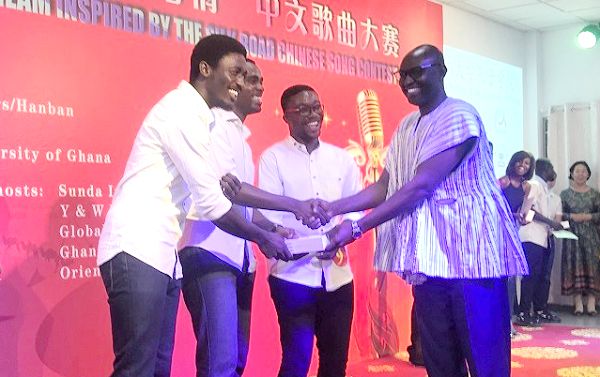
MPs should speak local languages in Parliament - Linguist
A senior lecturer and coordinator of the Chinese section at the University of Ghana Department of linguistics, Dr Clement Appah has observed that the plurality of the Ghanaian culture should make it possible for members of Parliament to express themselves in their local languages at parliamentary sittings.
He said although English is Ghana’s official language, it is somewhat limited in discussing pertinent issues that affect people at the local level and that parliamentarians should be able to participate in debates using simultaneous translation devices that allow real-time in-ear translations.
"We should make it possible for people to come to parliament to use their local languages and should encourage everybody who is influential in this country to show that reading the local languages is fun and important,” he said.
Dr Appah who was speaking on the sidelines of the second edition of the Chinese song contest at the Confucius Institute at the University of Ghana, Legon last Friday, said “Let people come into government with their knowledge and not feel that or with all the knowledge they have they can’t make it if they can’t speak English."
This comes after President Akufo Addo had announced at the 17th Summit of Organisation Internationale de la Francophonie that it intends to make French a second official language in Ghana.
The president had indicated that the government has signed a linguistic pact with the International Organisation while emphasising on the strategic importance of developing French as a second language which he believes will go a long way to foster mutual and existing trade and investment relationship among member countries in the West African sub-region.
The government’s position has generated debate on social media with users criticising the president for what they said was downplaying the importance of local languages in the national discourse.
Commenting on the issue, the linguist described the president’s commitment to make Ghana a bilingual state as a misnomer.
According to him, Ghana is a multilingual state where the average citizen speaks more than 3 languages.
He explained that “Ghana has a lot of languages which people speak regularly, and it is common to find children who speak up to 8 - 10 languages in compound house settings because those languages are spoken there….“Yes, we can add more languages but when you are staking a policy we want to find out which of the languages we encourage is really useful to the people," He added.
"I’m not saying we shouldn’t learn French, we should. Language is an asset, so I will encourage people to add more languages but...I want to ask those who speak French (Ghanaians) when was the last time they spoke French to a non-English person. You won’t find any. So, we don’t need as much French as we make it sound," Dr Appah argued.
According to him, any educational policy or literacy development by the government should be focused on multi-literacy where students are encouraged to learn additional local and foreign languages.
Speaking on the competition, he said the contest was an opportunity for the students to test their talent and to display their understanding of the Chinese culture as they interpret through music.
"If you can learn the language and sing in the language. That shows your level of mastery and you could tell the students understood what they are singing, and they were acting the understanding out, “he said.
The winner of the contest, Jacques Kojo Akatey, expressed surprise at his win indicating that his stage performances might have given him the upper hand over his fellow competitors.
The level 300 accounting and Chinese student believes that his passion for languages made the difference adding that winning the contest has elevated his confidence and was optimistic it will propel him to greater success should he pursue music as a full-time career.
The Director of the Institute, Dr Meilian Mei in her speech noted that the contest was one of the many activities that bridged the gap between Ghana and China and provided a platform for cultural exchange and the opportunity to deepen the friendship between both countries.
The competition was on the theme "Chinese Dream Inspired by the Silk Road" and was contested by 10 students selected during a preliminary audition.
The contestants performed several renditions of Chinese songs which drew applause and cheers from the audience.
